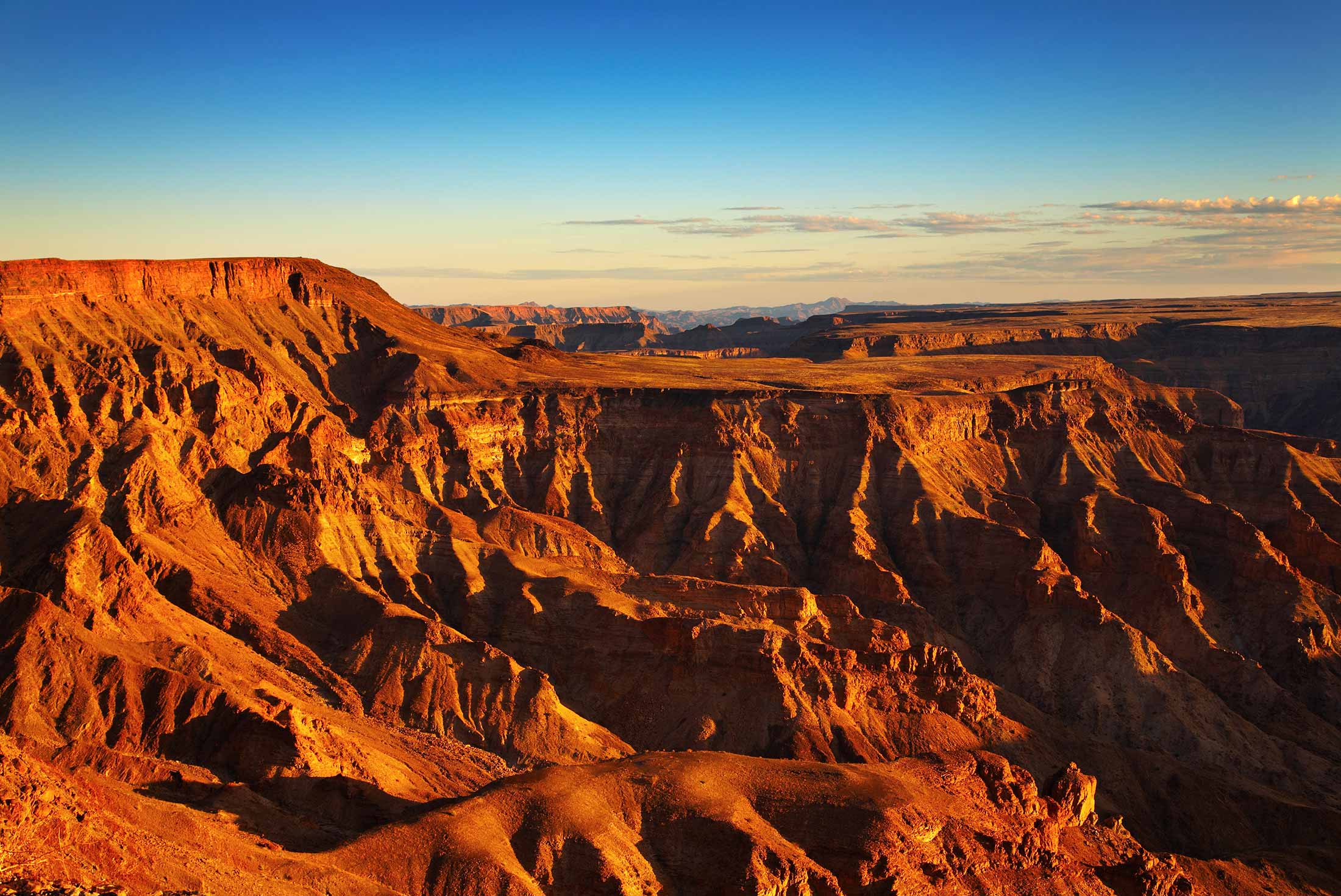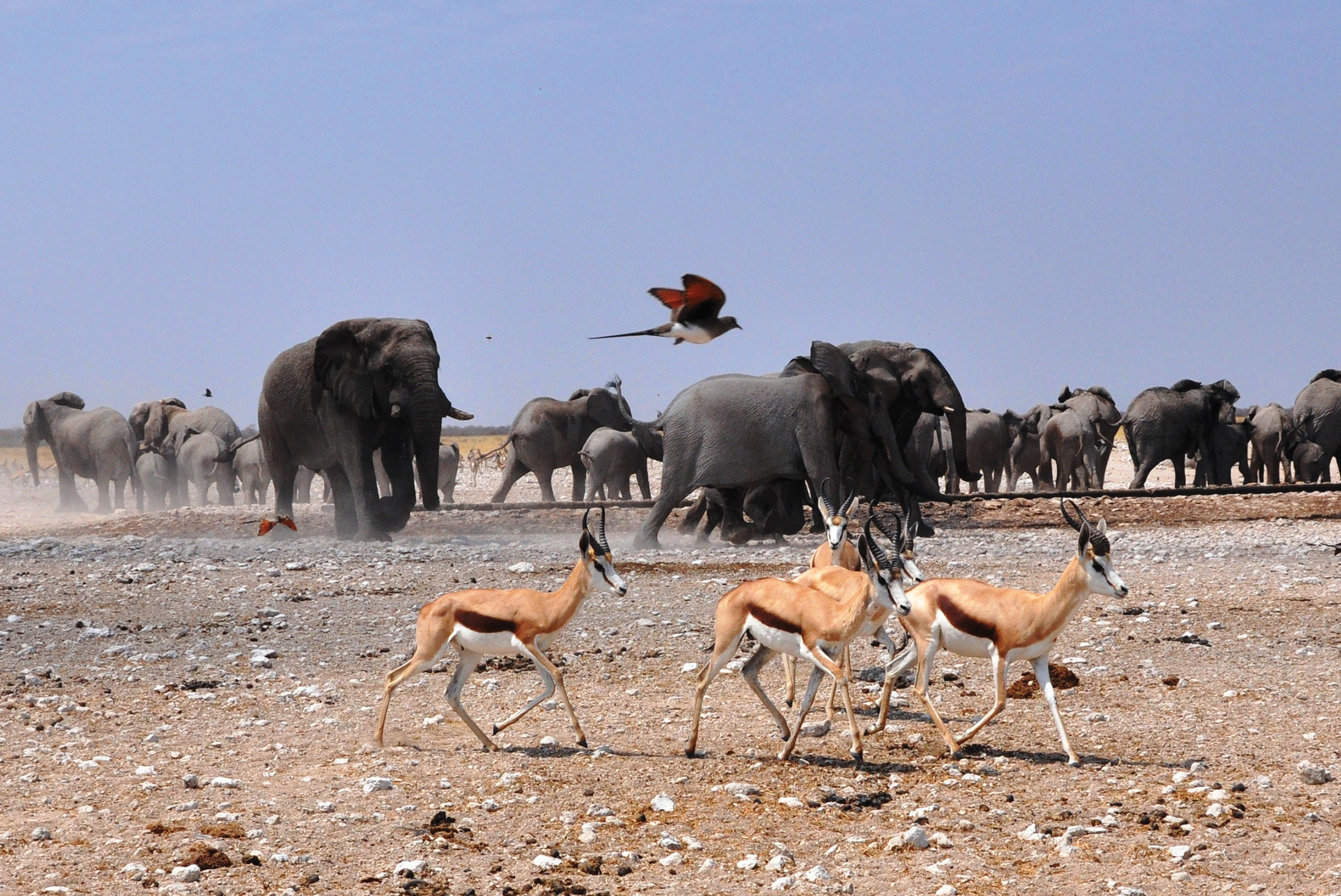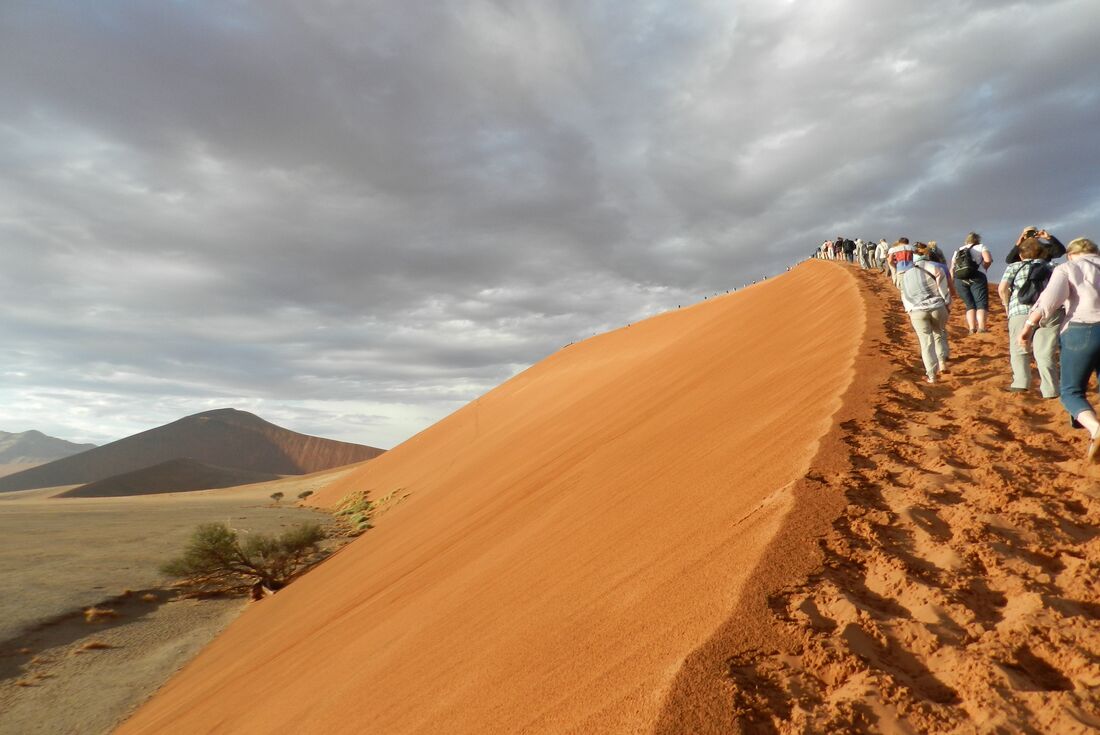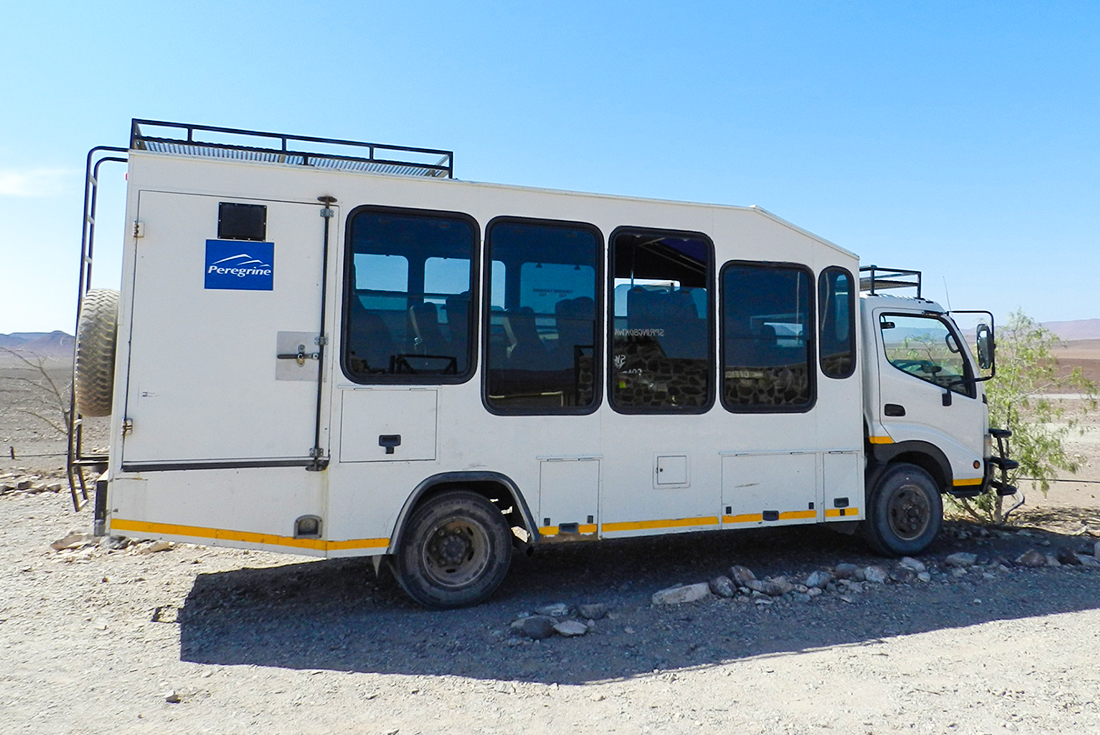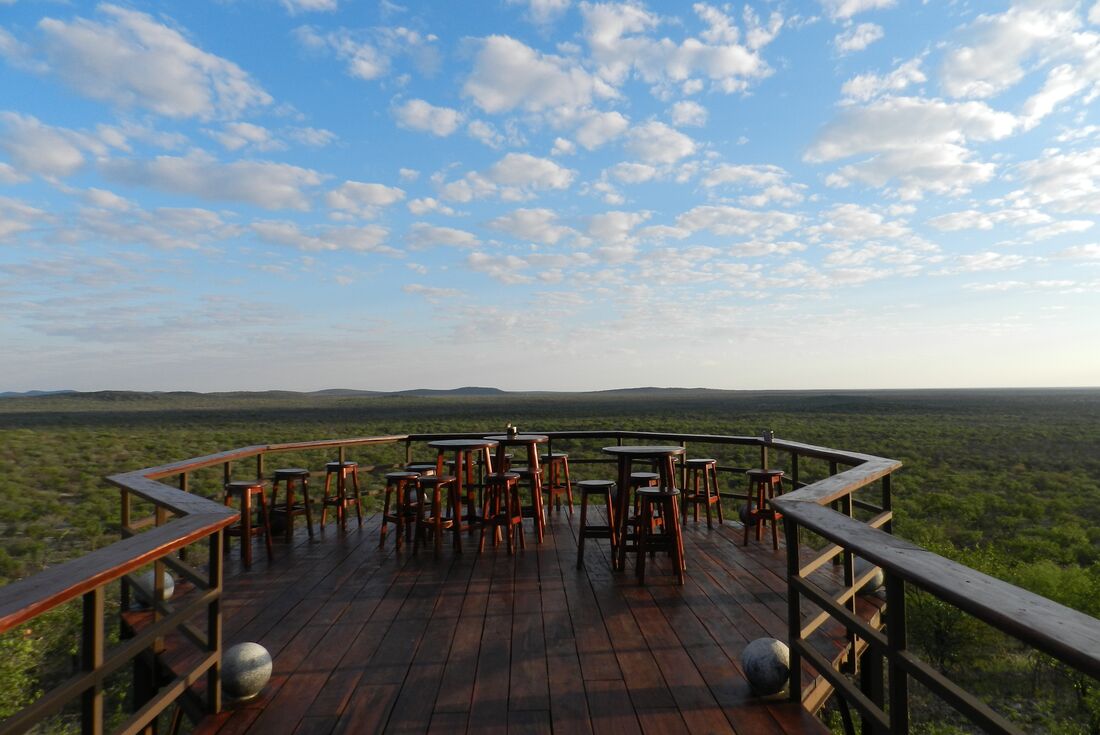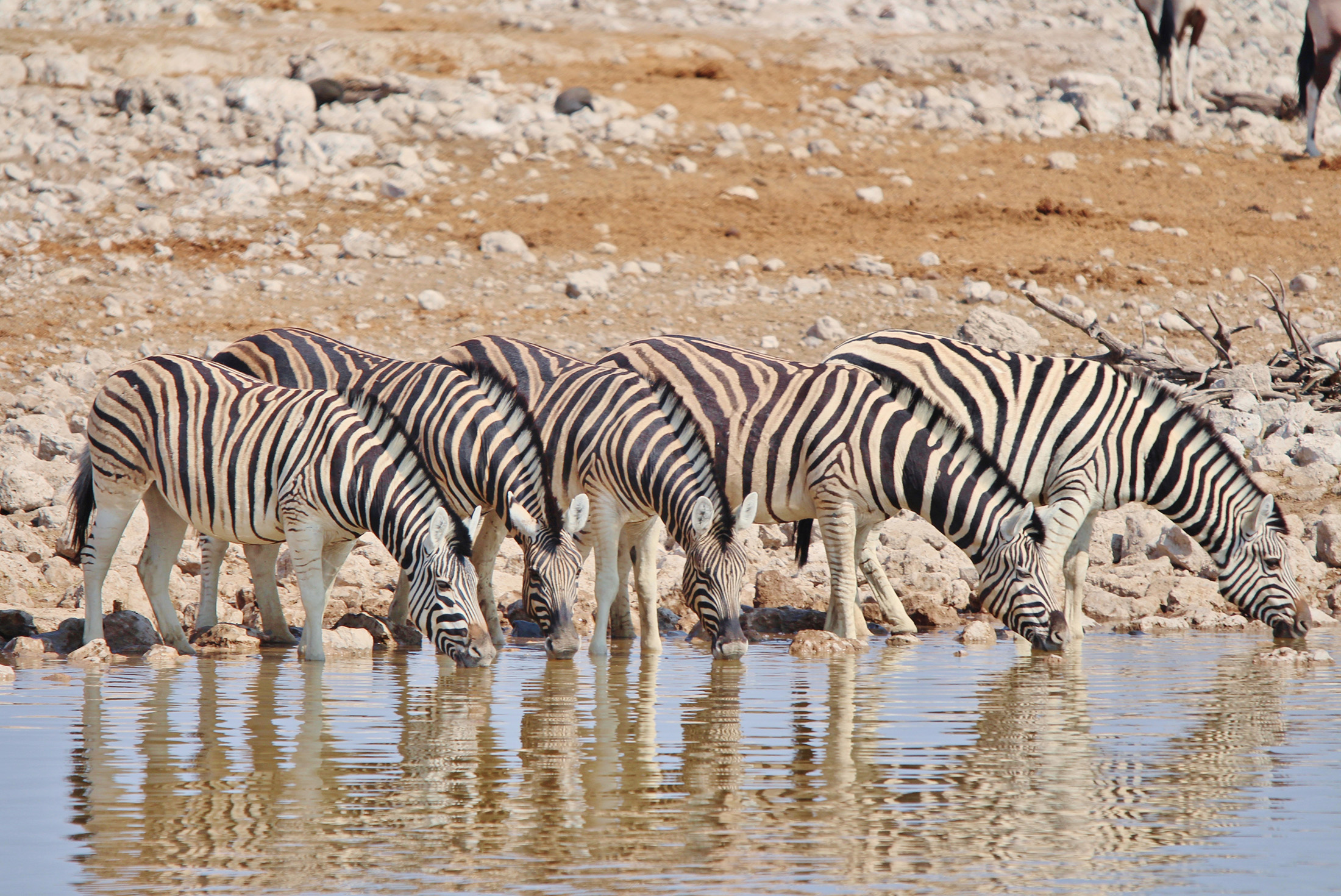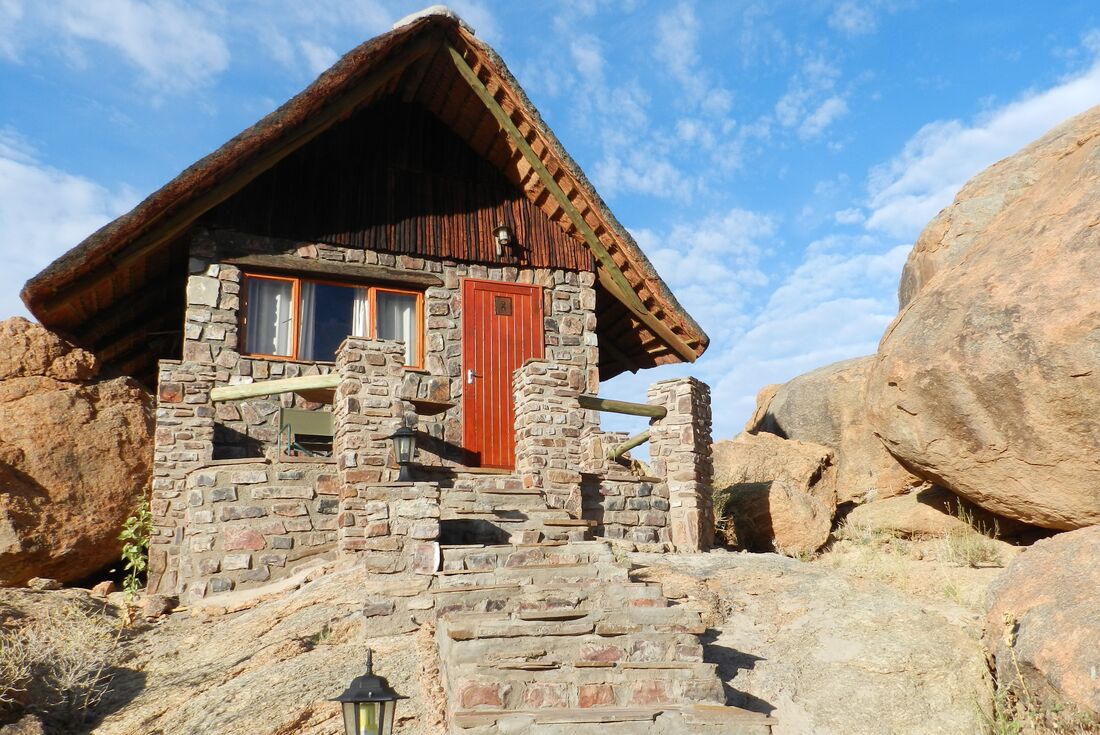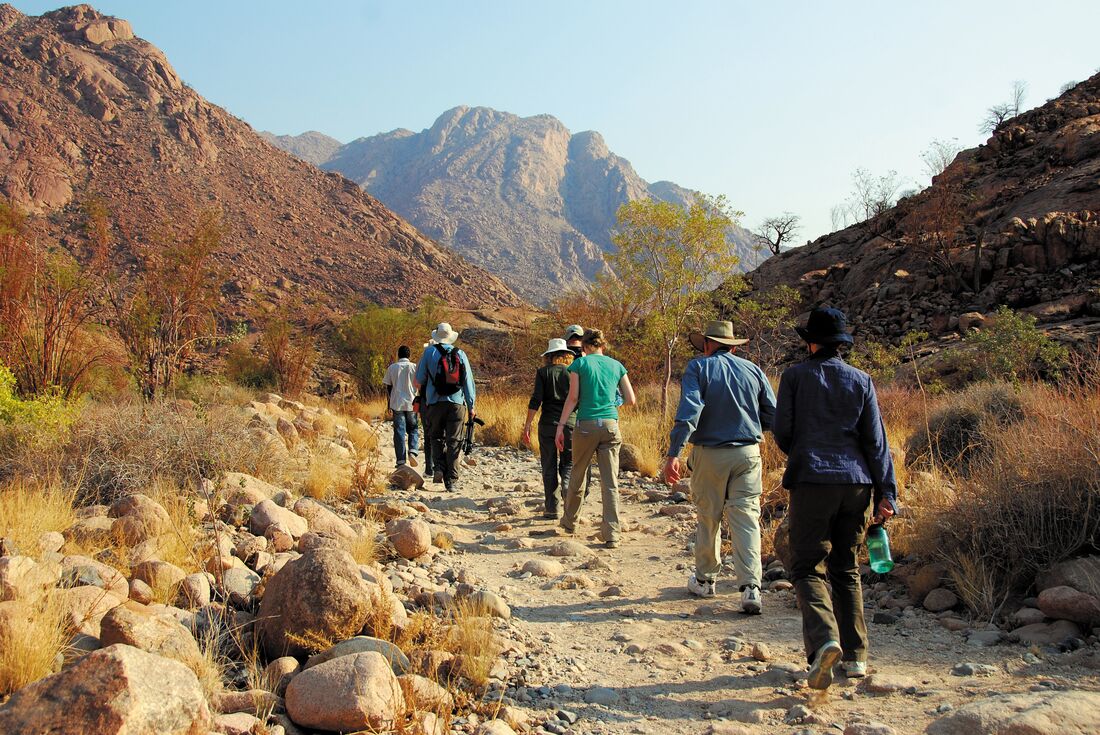- The unique landscape of Etosha National Park makes it one of the best animal-viewing destinations in the world, and you'll enjoy a full day of game drives here.
- End the day in Damaraland by ascending the hill to a viewing platform for a sweeping vista of the Mopane woodland illuminated by the setting sun.
- Enjoy a wine and cheese tasting experience on a working wine farm in the Olifants River Valley, with your host ‘Sparky’.
- As eerie as they are fascinating, the sand dunes of the Sossusvlei can be seen in all their blazing beauty from the top of Dune 45.
- Enjoy an adventurous yet relaxing canoe trip down the picturesque Orange River as the day melts into sunset.
- Rise early and witness the colourful sunrise and a picnic breakfast from the edge of Fish River Canyon, the second largest chasm of its type in the world, before returning to Canyon Lodge, our feature stay on this trip.
- Step inside Faldela's Purple House in the Bo-Kaap region of Cape Town for an authentic home-cooked dinner. Taste some of the traditional dishes such as 'Bredie', 'Chilli Bites' and 'Koesisters'.
23 Aug 2021
Classic Namibia
PFCN
Validity: 01 Jan 2020 to 31 Dec 2021
Flanked by ocean and desert, Namibia boasts both landscapes and wildlife of world-class diversity. Travelling down the coast from Windhoek, see how vast herds of herbivores make Etosha National Park one of the continent’s premier game-viewing destinations. The peaks, petrified forest, ancient rock paintings and Damara culture make Damaraland a fascinating insight into the history of humans and the earth, while the landscapes surrounding Swakopmund and Sossusvlei are simply some of the greatest desert scenery in the world. Climb to the top of Dune 45 and be rewarded with unreal views across wild terrain that is quickly becoming iconic. Nestle into unique accommodation among granite boulders, then take in the view across the second largest canyon in the world. Drift down the Orange River in a canoe, then cruise through the world of South African wine on a tasting experience at a wine farm in Trawal. Finish up in Cape Town, where stunning coastline, Table Mountain, and a home-cooked dinner in the colourful Bo-Kapp neighbourhood await. This two-week journey from Namibia into South Africa is one you’ll need your camera for.
Peregrine
Overland,Wildlife
4WD vehicle,Custom-built overland vehicle,On foot,Private vehicle,Mokoro
2
You do not need any real fitness for this safari. However please note that, in some areas, the roads are in quite poor condition and you may experience a fair amount of bouncing around which can be strenuous.
Hotel Thule
1 Gorges Street
Windhoek
NAMIBIA
Phone: +264 61371950
The Hotel Thule is a converted, former luxury home located high on a hill above the city with a balcony that is ideal for ‘alfresco’ wining and dining, whilst admiring the star-lit skies above. Guest rooms are fully air-conditioned with a tea and coffee station, a mini bar, in room safe, satellite TV with satellite channels. The hotel is located 45kms from Windhoek's Hosea Kutako International Airport.
An airport arrival transfer is included. This transfer is only valid if arriving on day 1 or if you have booked pre-trip accommodation through Peregrine. Please provide your flight details at the time of booking, or at a minimum 15 days prior to travel (note - we may not be able confirm request made within 15 days of travel). Once you have provided your details a transfer representative will be booked to meet you at the airport and transfer you to your hotel. Your driver will be waiting for you in the arrivals hall holding a Peregrine sign with your name. If you are unable to find your driver please phone +264 61 254 708. The driver will wait for an hour after your scheduled arrival time. If you are delayed beyond one hour after your scheduled arrival time, please make your own way to the hotel. If you miss your transfer please advise your group leader at your group meeting. Metered Taxis are available just outside the arrivals area. The Windhoek airport is approximately 48 km from town so you should expect to pay anywhere from 250NAD to 300NAD. Shuttle buses from the airport are the best option as they are generally safer, know where the hotels are and have fixed prices (as opposed to the taxis).
The Commodore Hotel
Portswood Square Portswood Rd
V&A Waterfront
Cape Town
8002
SOUTH AFRICA
Phone: +27 214151000
Overlooking Cape Town's vibrant V&A Waterfront, where Table Mountain and the sea meet, the Commodore is ideally located. It is close to countless restaurants and shops and offers views of the harbour, Robben Island and Table Mountain. The hotel facilities include an outdoor pool with poolside bar, beauty spa and free Wifi in public areas. Guest rooms are fully air conditioned and include a TV with satellite channels, in room safe, ensuites and free WiFi. The hotel is 21kms from Cape Town International Airport.
A private departure transfer is available for pre-booking through Peregrine. Please speak to your booking agent for more information. If you have pre-booked a departure transfer, please ensure you have provided Peregrine with your departure flight details at least 15 days before the departure of your Peregrine trip.
1. A complimentary airport arrival transfer is included; valid if you are arriving on Day 1 or if you have booked pre-tour accommodation through us. You must provide your flight details to your booking agent at least 14 days prior to travel. 2. A single supplement is available if you'd prefer not to share a room;on this trip. The single supplement applies to all nights of your trip;and is subject to availability. Please speak to your booking agent for further information. 3. This trip travels on purpose-built overland vehicles. This means there are restrictions on the size and weight of your luggage. Please refer to the Packing section of the Essential Trip Information for details.
All group trips are accompanied by one of our group leaders. The aim of the group leader is to take the hassle out of your travels and to help you have the best trip possible. We endeavour to provide the services of an experienced leader however, due to the seasonality of travel, rare situations may arise where your leader is new to a particular region or training other group leaders. Your leader will provide information on the places you are travelling through, offer suggestions for things to do and see, recommend great local eating venues and introduce you to our local friends. While not being guides in the traditional sense you can expect them to have a broad general knowledge of the places visited on the trip, including historical, cultural, religious and social aspects. We aim to support local guides who have specialised knowledge of the regions we visit. If you were interested in delving deeper into the local culture at a specific site or location then your leader can recommend a local guide service in most of the main destinations of your trip. On this trip you will be accompanied by 2 crew members - Group Leader, and Driver
Many national governments provide a regularly updated advice service on safety issues involved with international travel. We recommend that you check your government's advice for their latest travel information before departure and ensure that your travel insurance covers you for all areas your itinerary covers. Please refer to our website's travel alerts page for links to major travel advisories and updates on safety issues affecting our trip. PERSONAL BELONGINGS: We strongly recommend the use of a neck wallet or money belt while travelling, for the safe-keeping of your passport, air tickets, cash and other valuable items. Leave your valuable jewellery at home - you won't need it while travelling. Many of our hotels have safety deposit boxes, which is the most secure way of storing your valuables. A lock is recommended for securing your luggage. FREE TIME: Your leader will accompany you on all included activities, however during your trip you'll have some free time to pursue your own interests, relax and take it easy or explore at your leisure. Please use your own good judgement when selecting an activity in your free time. Please also note that your group leader has the authority to amend or cancel any part of the trip itinerary if it's deemed necessary due to safety concerns.
FIRE PRECAUTIONS Please be aware that local laws governing tourism facilities in this region differ from those in your home country and not all the accommodation which we use has a fire exit, fire extinguishers or smoke alarms. BALCONIES Some hotel balconies don't meet western standards in terms of the width of the balcony fence being narrower than 10cm. TRAFFIC AND DRIVING ON THE OTHER SIDE OF THE ROAD Depending on where you come from please note that drivers in this part of the world may drive on the opposite side of the road from what you are used to. Look both ways before crossing any road. Traffic can be a little more chaotic than you might be used to at home. Be aware! SEAT BELTS Please be aware that local laws governing transportation safety may differ from those in your home country and not all the transport which we use is able to provide seat belts. PICK POCKETING & PERSONAL SAFETY While travelling there is always the risk of pick-pocketing and petty theft, particularly in the more touristy cities. We recommend that you exercise caution when walking at night and encourage you to walk in groups and only on main, well-lit thoroughfares. Be particularly vigilant on public transport. Simple measures like carrying your day pack on your front, not hanging your bag over the back of your chair or on the floor and wearing a money belt will reduce any chance that your valuables should go missing. WATER SAFETY Please take care when taking part in any activities in the ocean, river or open water, where waves and currents can be unpredictable. It's expected that anyone taking part in water activities is able to swim and have experience in open water. All swimmers should seek local advice before entering the water. TRAVEL ADVICE & TRAVEL INSURANCE We recommend that you check your government's advice in relation to the areas you will be visiting for their latest travel information before departure and ensure that your travel insurance covers you for all areas your itinerary covers.
PASSPORT You will need a valid passport to travel internationally. As a general rule, most countries require that your passport has a minimum of 6 months validity remaining. Your passport details are required to complete your booking. Please ensure the name on your passport matches the name on your booking and airline tickets exactly and contact us immediately if there are any errors. We recommend taking copies of the main passport pages and other important documents with you as well as leave copies at home with family or friends. VISAS Visas are the responsibility of the individual traveller. Entry requirements can change at any time. It is important that you check your government's foreign travel advisories along with the consular website of the country or countries you are travelling to for the most up to date information specific to your nationality and circumstances. Please be aware that not all visa information found online from other sources may be valid while COVID-19 restrictions are in place. Visas can take several weeks to process, so make sure you research the requirements as soon as you have booked your trip to allow for obtaining any necessary documents as well as the application and processing time. Your booking consultant can advise on a visa processing service or you can apply yourself directly through a consulate. COVID-19 Entry and Exit Requirements Below you will find general visa advice about the destinations on your trip. Due to constantly evolving COVID-19 requirements and restrictions, please refer to your government's foreign travel advice for the most up to date information.You may also refer to our travel alert page for more info https://www.intrepidtravel.com/en/travel-alerts Make sure you are familiar with the current border measures and entry requirements as these are quite complex and changing frequently without notice. Please also ensure you have a travel insurance policy that covers your travels as well as medical or COVID-19 related expenses within the country. RETURN TRAVEL Please ensure you stay up to date with any current testing or quarantine requirements for returning to your home country or transiting through other destinations after the completion of your tour. We are able to help facilitate taking a COVID-19 test while on trip. Please ensure you have funds available to cover the cost of this test which will be payable directly to the testing site. Your Intrepid Tour Leader will provide more details at the group meeting as well as assist with booking appointments for all travellers who need to be tested. NAMIBIA: Many nationalities are not required to obtain a tourist visa in Namibia if traveling for a maximum period of 90 days. For other nationalities, please contact the local consulate or embassy for visa requirements. Please check with the relevant visa office before departure to make sure there has been no change. SOUTH AFRICA: Many countries do not need visas to visit South Africa as a tourist for up to three months. Please check with the relevant consulates as to whether a visa is required Entry Requirements – Passports: Please note that non-machine readable passports are no longer accepted by South African immigration. All visitors to South Africa must have a machine readable travel document (e-passport). Failure to present an e-passport will result in denied entry. Passengers with a valid visa issued in a non-machine readable passport will be handled on a case by case basis, but a fine will still be applicable. Entry Requirements - Yellow Fever Certificate: A valid Yellow Fever Vaccination Certificate is required for all passengers over one year of age who arrive or are transiting through South Africa, from a country or region listed by the World Health Organization as infected by yellow fever. Travellers unable to present a valid yellow fever vaccination certificate issued at least 10 days before arrival in South Africa will be refused entry. There is no option for travellers without a vaccination certificate to be vaccinated on arrival. Please note this also includes transiting through an infected country or region. NEW ZEALAND PASSPORT HOLDERS: Effective 15th August 2019, New Zealand visitors no longer require a visa for South Africa. BORDER CROSSINGS: There is 1 border crossing on this trip: Day 21: Namibia to South Africa at the Noordoewer border post.
The unique landscape of Etosha National Park makes it one of the best animal-viewing destinations in the world, and you'll enjoy a full day of game drives here.
End the day in Damaraland by ascending the hill to a viewing platform for a sweeping vista of the Mopane woodland illuminated by the setting sun.
Enjoy a wine and cheese tasting experience on a working wine farm in the Olifants River Valley, with your host ‘Sparky’.
As eerie as they are fascinating, the sand dunes of the Sossusvlei can be seen in all their blazing beauty from the top of Dune 45.
Enjoy an adventurous yet relaxing canoe trip down the picturesque Orange River as the day melts into sunset.
Rise early and witness the colourful sunrise and a picnic breakfast from the edge of Fish River Canyon, the second largest chasm of its type in the world, before returning to Canyon Lodge, our feature stay on this trip.
Step inside Faldela's Purple House in the Bo-Kaap region of Cape Town for an authentic home-cooked dinner. Taste some of the traditional dishes such as 'Bredie', 'Chilli Bites' and 'Koesisters'.
Purpose-built overland vehicles are used for the duration of this trip. While these vehicles are not air-conditioned, all windows open to allow fresh air flow. Be prepared for some dust, heat and wind. This itinerary features some long travel days, which can be exacerbated by bumpy African roads. Please review the approximate durations of travel listed throughout the itinerary. Overlanding is the perfect journey for those travellers with an open mind and the spirit for adventure. However it may be quite different to any style of travel you have experienced before. Ask your agent for a copy of our Peregrine overlanding flyer for more information or head to https://www.peregrineadventures.com/africa-overland As the early bird catches the worm, the early camper sights the animals. There will be many early starts either to make use of the better safari time or to beat the morning traffic on long travel days. You don't need to be a professional athlete to go on an overland safari, but you will need a good level of physical resilience and movement, especially for entering and exiting the vehicles. There's also a half-day canoe activity along the Orange River on this trip Namibia summer (November–March) can be very hot and humid with maximum temperatures around 30-35°C and peaks of over 40°C in the desert. It’s important to use sun protection, wear layers to combat the heat and drink plenty of water. Please carefully consider the time of the year you wish to travel and your suitability to that season.
GENERAL HEALTH All travellers need to be in good physical health in order to participate fully on this trip. When selecting your trip please make sure you have read through the itinerary carefully and assess your ability to manage and enjoy our style of travel. Please note that if in the opinion of our group leader or local guide any traveller is unable to complete the itinerary without undue risk to themselves and/or the rest of the group, we reserve the right to exclude them from all or part of a trip without refund. You should consult your doctor for up-to-date medical travel information or for any necessary vaccinations before departure. We recommend that you carry a first aid kit as well as any personal medical requirements as they may not easily be obtained while travelling. COVID-19 The safety and wellbeing of our travellers, leaders, crew, staff, and suppliers continues to remain our highest priority as we travel. You can read more about how we will keep you safe on our trips, including our COVID-19 Health & Safety Guidelines here: https://www.peregrineadventures.com/safe-travels HEALTH SCREENING If you are unwell prior to travelling, please stay at home and contact us to make alternative arrangements. At the group meeting, you will be asked to complete a self-screening health form and report any COVID-19 symptoms as well as any close contact with someone who has suspected or confirmed COVID-19. If you are displaying any symptoms or have any health concerns at this time, we will follow the advice of local health authorities to determine whether medical assistance, isolation or further action is required. We ask all travellers to continue to monitor their health throughout their travels and report any relevant symptoms to their tour leader. TESTING & VACCINATION POLICY From 1st May 2021 we have introduced new safety measures that apply on all of our trips, except for tours in Australia and New Zealand. You will need to show either of the below to your leader at the Group Meeting on Day 1 of your trip: - Proof of COVID-19 vaccination, or - Proof of negative COVID-19 test conducted no more than 72 hours before day 1 of your trip, or - Proof of recovery documentation In addition, if you’re aged 70+ or have an existing health condition that puts you at a higher risk of serious COVID-19 disease, you are also required to provide proof of vaccination before you can join a trip. This policy is in addition to any specific testing or vaccination requirements for entry to a destination or required by your airline. For more information, including a detailed FAQ about this policy, please visit: https://www.peregrineadventures.com/covid19 YELLOW FEVER: A valid international certificate of vaccination against Yellow Fever is required in many countries if you are arriving from a country with risk of yellow fever (eg. Kenya). You may need to present this on arrival at the airport or border crossing. Some countries will refuse entry if you are unable to present your certificate. It's also quite common for your home country to request a Yellow Fever certificate on your arrival back home. It is your responsibility to check with your doctor well in advance of leaving home about the Yellow Fever requirements for the countries you'll be visiting. TYPHOID: It is recommended that if you are travelling to Harare you make sure that your Typhoid vaccinations are up to date. There has been an outbreak of typhoid in parts of Harare, with over 1500 cases reported since October 2011. For more information speak to your doctor and see the World Health Organization (WHO) website. DRINKING WATER As a rule we recommend you don't drink tap water, even in hotels, as it may contain much higher levels of different minerals than the water you are used to at home. For local people this is not a problem as their bodies are used to this and can cope, but for visitors drinking the tap water can result in illness. Generally this isn't serious, an upset stomach being the only symptom, but it's enough to spoil a day or two of your holiday. Many hotels and lodges provide safe drinking water, while bottled water is another alternative. Water consumption should be about two litres a day. Rehydration salts, motion sickness tablets, and diarrhoea blockers are available from many pharmacies.
Your group leader or representative will endeavour to cater for specific dietary requirements where possible, and vegetarianism and gluten intolerance will be catered for in most instances. There are, however some meals and activities that are fixed in advance and therefore cannot be modified to suit dietary requirements. Please notify your booking consultant of any dietary requirements at the time of booking. For those suffering from particular food allergies, your group leader or representative will endeavour to disclose to their fullest knowledge the main ingredients in dishes being consumed. It is, however, your personal responsibility to ensure that you do not ingest any foods to which you are allergic. LODGE-PACKED MEALS: There are a number of days on this itinerary where your breakfast or lunch will be a ‘packed picnic meal’ provided by our lodge. Packed meals usually consist of a sandwich, a piece of fruit, a juice, and a snack such as potato chips/crisps, nuts, muffin, or a muesli bar. On some days your crew will shop and prepare lunches themselves using the truck picnic gear and utensils. This usually happens when we have early morning game drives and want to get into the park by sunrise, are out in National Parks all day, or in some instances, en-route to our next destination when there is little or no alternatives.
When it comes to money matters on the trip, every traveller is a little different. You know your spending habits better than we do, so please budget a sensible amount for things like meals not included, drinks, shopping, optional activities, tipping and laundry. It’s always better to bring a little more than you think you’ll need. Also make sure you’ve read your trip details thoroughly so you know what’s included in the trip price and what isn’t. This should make budgeting a little easier. You’ll find this info in the Inclusions section of your Essential Trip Information (that’s this document). Please note: all recommendations for additional costs are in USD. You will need to convert these into the relevant local currency. MEALS NOT INCLUDED Breakfast, dinner and most lunches are included while on our overland safaris and/or lodge based trips. For lunches not included, a budget of USD10 to USD15 per meal will be more than sufficient. For dinners not included, your leader will normally recommend options and restaurants where you can safely try the local specialties of the region. Expect meals to cost between USD12 to USD25 for a main. These are indicative prices only. If you are in a tight budget or are happy to try local food, you can eat cheaper than this. If you want to try just the finest food at the finest restaurants, then you can expect meals to cost as much as in western countries. TIPPING Gratuities for all services are included in the cost of your trip. Although not compulsory, if you feel you have received outstanding services throughout your trip, you may also consider tipping your leader and crew (if applicable) as these are not included. The amount is entirely a personal preference; however as a guideline USD2 to USD4 per staff member, per day can be used. Of course you are free to tip more or less as you see fit, depending on your perception of service quality and the length of your trip. Remember, a tip is not compulsory and should only be given when you receive excellent service. EMERGENCY FUNDS We try to plan for every eventuality, but there are still some things beyond our control. Please make sure you bring an extra USD500 for emergencies (e.g. natural disasters or civil unrest). Sometimes these things necessitate last minute changes to our itineraries, and we can’t guarantee there won’t be some extra costs involved. CREDIT CARDS, ATMS AND MONEY EXCHANGE: Credit cards are generally accepted in tourist shops and some restaurants across Africa. Visa and Mastercard are generally preferred over American Express, Diners, etc. Smaller venues take cash only. Foreign currency is easily changed at exchange bureaus and they generally offer the best rates. With ATMs being increasingly available in the many major towns and cities, credit or debit cards are a convenient way to access money. Be aware that your withdrawing limit may vary from country to country (regardless of your withdrawing limit in your home country) and it can be as low as the equivalent to USD100 per day. Throughout Africa, cards with the Visa logo are most readily recognised, although MasterCard is also accepted in most places. A charge is made for each international transaction - please check with your bank how much this fee will be. Check with your bank before leaving home that your card can be used as a debit card in Africa. You may also want to notify your bank that you are visiting Africa as it's not unknown for banks to freeze cards which show sudden transactions in other countries. If you're on a multi-country tour, your tour leader will be able to give you an approximate idea of how much money you may need for your stay in each country. PLEASE NOTE: Many businesses and banks in Africa, especially East Africa, do not accept US dollar notes older than 2006. If you are bringing USD, we strongly recommend large bills in good condition, 2006 series onwards only. Any old or damaged notes may not be accepted. ACCESSING CASH IN ZIMBABWE: Zimbabwe has now reverted to their own currency, Zimbabwe dollars. However accessing this currency can be difficult and exchanging money at banks encounters long queues. Optional activities can still and must be paid in USD, while visas on arrival can also be paid in USD. On ground costs such as lunches and market purchases must be paid in Zimbabwe dollars or by using a credit card. You should plan your travel expenses in advance and bring sufficient USD into the country to support your stay. Your leader or local representative will be on hand to advise on this matter should you need it. COMMISSIONS Unfortunately, commissions in exchange for recommending particular shops or restaurants are an ingrained part of the tourism industry. Rather than turning a blind eye, we’ve tried to legitimise the practise with a centralised fund. Moneys are collected from recommended and fully vetted suppliers and funnelled back into our business. This keeps the trip cost low (for us and for you) and makes sure you only get the best experiences. If you’re unhappy with any places your leader recommends, or feel the quality of the trip is being compromised in any way, please let us know in your feedback.
We recommend you pack as lightly as possible and make sure that you are able to carry and lift your own luggage, and walk with it for short distances. Most travellers carry their luggage in a backpack, although an overnight bag with a shoulder strap would suffice if you travel lightly. Smaller bags or backpacks with wheels are convenient although we recommend your bag has carry straps. You'll also need a day pack/bag to carry water and a camera etc for day trips. Below are some ideas and helpful tips on what you specifically need for this trip. ESSENTIALS: - Closed in shoes will help to protect your feet from cuts and scratches when walking through bush/grass-lands and will also act as a barrier protection in rare cases against bites or stings from dangerous animals in this environment. - Lightweight clothing. You will need to bring a mixture of lightweight clothing, some warm items for the evenings, and long shirts and pants for protection against mosquitoes in the malaria areas. Clothes should be easy to wash and dry. Some people like to take jeans for evenings out but they can be tough to dry and should not be used for trekking. Avoid nylon and other synthetics, which can be very uncomfortable in hot weather. Ex-military or military style clothing and equipment is NOT recommended. - Sun protection - hat, sunscreen, sunglasses. RECOMMENDED: - A good quality, high-beam headlamp or torch for around the lodges and permanent tented camps at night. Some properties have limited outdoor lighting and are powered by generators that switch off at a certain time. - A waterproof/windproof jacket is a good idea for wet days, and early morning or evening game activities when it can be cool. - Warm fleece and beanie for morning and evening game drives. - Personal medical kit. Your guide will carry a large kit, but we recommend you carry items such as mild pain killers, electrolytes and bandaids. - Insect repellent. - Water bottle. We recommend at least a 1 litre capacity. Our vehicles have large tanks of treated water for refills. - Camera with good zoom. - Binoculars. OPTIONAL: - Ear plugs to guard against a snoring room-mate. - A good book, a journal or smart phone with music (and a power bank). LUGGAGE LIMIT: Luggage is stored in a dedicated compartment at the back of our overland vehicles. Please keep your luggage to a minimum. One small soft-sided bag plus a day pack (no more than 15-20kgs in total per person) is essential. Please do not bring hard/externally framed suitcases as they are difficult to store and can damage equipment and other passengers' belongings. If your trip is beginning and ending at the same location, excess luggage can usually be stored at your arrival/departure hotel and can be collected after your trip. VALUABLES: Please try to avoid bringing unnecessary valuables. Use your hotel safes and the safe on the overland truck to store the bulk of your money, passport, and airline tickets. It’s also a good idea to purchase a money belt or pouch that is easily hidden. We strongly recommend that you photocopy all important documents e.g. airline tickets, passport, vaccination certificate, etc. and keep the copies separate from the originals. While not valid, a photocopy makes it much easier to obtain replacements if necessary. BATTERIES/POWER: We recommend that you carry an extra battery for your camera and/or a power bank. Our overland vehicles are equipped with multiple power boards which may be used at the crew’s discretion. Bear in mind that only a minimal number of items can be charged at a time and will not be allowed if there is a risk of running the vehicle’s batteries low. Batteries may also be recharged from hotel room wall sockets. Hotels and lodges have electricity and charging of batteries is advised before checking out the following day. CONSERVATIVE DRESS FOR WOMEN: When packing, be aware that there are a wide range of cultural differences for women in Africa. We recommend our travellers dress modestly, with skirts or shorts that reach just above the knee and tops that cover shoulders at a minimum. If visiting coastal areas wear a cover-up when you step off the beaches.
PLASTIC BAG BANS ACROSS AFRICA While Namibia holds people liable to a fine of N$500 or imprisonment for entering Game Parks with a plastic bag, Botswana has announced a countrywide ban on plastic bags to come into effect on 1 November 2018. The ban will make the importing, trading and commercial use of plastic bags a criminal offence. Exceptions will be made for plastics that are essential for health and hygiene. With these announcements, Botswana and Namibia join other African countries such as Tanzania, Kenya, Ethiopia, Uganda, Tunisia, Morocco, Rwanda, Uganda, Somalia and Eritrea that have banned plastic bags. South Africa imposed a levy on plastic bags in 2004 but they have not yet been banned. Many countries are strictly enforcing this and have been searching luggage at border points. Camping stores are good for obtaining waterproof reusable bags, for dirty laundry etc, prior to departure.
WEATHER IN NAMIBIA & SOUTH AFRICA May to October is considered one of the best times to visit Namibia as the days are warm and sunny and the weather is generally dry. South Africa is an excellent year-round destination. Winters are mild, dry and good for wildlife viewing. Summers can get very hot and humid, but are a great time for visiting beaches and festivals. Spring is a great time for viewing wildflowers in the Northern and Western Cape provinces, and very little rain falls anywhere in autumn but the days are warm and the nights cool.
Everyone has the right to feel safe when they travel. We don’t tolerate any form of violence (verbal or physical) or sexual harassment, either between customers or involving our leaders, partners or local people. Sexual relationships between a tour leader and a customer are strictly forbidden. Use or possession of illegal drugs will not be tolerated on our trips. If you choose to consume alcohol while travelling, we encourage responsible drinking and expect that you’ll abide by the local laws regarding alcohol consumption. The sex tourism industry is known to exploit vulnerable people and have negative consequences on communities, including undermining the development of sustainable tourism. For this reason, patronising sex workers will not be tolerated on our trips. By travelling with us you are agreeing to adhere to these rules. You must at all times comply with the laws, customs, foreign exchange and drug regulations of all countries visited, and you also agree to travel in accordance with our Responsible Travel Guidelines. The decision of the group leader is final on all matters likely to affect the safety or well-being of any traveller or staff member participating in the trip. If you fail to comply with a decision made by a group leader, or interfere with the well-being or mobility of the group, the group leader may direct you to leave the trip immediately, with no right of refund. We may also elect not to carry you on any future trips booked. If you feel that someone is behaving inappropriately while travelling with us, please inform your tour leader or local guide immediately. Alternatively, contact us on the emergency contact number detailed in the Problems and Emergency Contact section of this Essential Trip Information. For additional Conditions of Carriage regarding COVID-19, see here: https://www.intrepidtravel.com/conditions-carriage
Can’t stop thinking about your adventure? Tell us all about it! We read each piece of feedback carefully and use it to make improvements for travellers like you. Share your experience with us at: https://www.peregrineadventures.com/feedback
Before you travel please download our pre-departure checklist to make sure you are fully prepared for your trip: http://www.peregrineadventures.com/pre-departure-travel-checklist
While we always endeavour to provide the best possible holiday experience, due to the nature of travel and the areas we visit sometimes things can and do go wrong. Should any issue occur while you are on your trip, it is imperative that you discuss this with your group leader or our local representative straight away so that they can do their best to rectify the problem and save any potential negative impact on the rest of your trip. We recognise that there may be times when your group leader/local partner may not be able to resolve a situation to your satisfaction - if this is the case, please ask the leader to speak to their direct manager. You may also choose to provide details in your online feedback, which we ask you to complete within 30 days of the end of your trip. Please do be aware that it is very difficult for us to provide any practical help after the trip is completed, so informing us while still travelling will give us the opportunity to resolve the issue in real-time. BOOKING ENQUIRIES / ISSUES For general enquiries or questions about your booking, please contact your agent or adventure specialist, or visit us at: www.peregrineadventures.com/contact-us CRISIS AND EMERGENCIES In case of a genuine crisis or emergency please contact our local ground representative on the number below: Peregrine’s Local Operator: +27828229407
Responsible travel is important to Peregrine. Maintaining our integrity and upholding principles of sustainable development are core to our travel ethos. Our values are ingrained in the culture of our business and in the design of our trips. We respect the people, cultures and local environments that we encounter while travelling and encourage the spread of good will and cross-cultural sharing. We are committed to making a positive contribution wherever possible. Read more about responsible travel with Peregrine here: https://www.peregrineadventures.com/responsible-travel
Help us change thousands of lives by creating meaningful work and supporting skills training in communities around the world. The Intrepid Foundation is the not-for-profit for Peregrine Adventures, a brand of the Intrepid Group, and works with local organisations around the world to improve the livelihoods of vulnerable individuals and communities through sustainable travel experiences. With our travellers’ help, we’ve contributed more than AU $6 million to over 100 community organisations since 2002. Did you know that tourism is one of the biggest contributors to the global economy, making up 1 out of every 10 jobs? That’s why we support local projects that create meaningful jobs and give people the skills they need to work in the destinations we take you to. And it’s why we exist – to make it easy for travellers to give back to the communities and places they’ve been in an effective and meaningful way. Intrepid Group covers all administration costs, every cent goes directly to the projects. Donating is simple and secure. Please ask your leader for information about the projects we support through The Intrepid Foundation or visit our website: http://www.theintrepidfoundation.org/
If you require a Sleep Apnea Machine to sleep please ensure that it is battery operated. Lodges and Permanent Tented Camps are often powered by generators which are turned off during the night. Canyon Lodge is a fusion of farmhouse flavour and natural splendour. Walkways lead to natural stone chalets nestled amongst granite boulders and perfectly landscaped gardens, making it feel like an oasis in the middle of nowhere.
Overlanding is the perfect journey for those travellers with an open mind and the spirit for adventure. However it may be quite different to any style of travel you have experienced before. Ask your agent for a copy of our Peregrine overlanding flyer for more information or head to http://www.peregrineadventures.com/en-au/africa-overland Our trucks are purpose-built, self contained safari vehicles. Our fleet of vehicles varies depending on your group size, trip route and style. In Southern Africa some departures may use vans and luggage trailers subject to group size and vehicle availability. It is also important to note that our overland vehicles are not air-conditioned, but all vehicles have windows that can be opened to allow for fresh air. There are many early starts with long hours spent driving on rough roads on all African itineraries. While most people love the chance to watch the changing landscape and daily village life, feedback shows that long periods of inactivity does not appeal to all clients. We provide the approximate distance covered each day and how many hours this normally takes to drive so that you can choose the safari experience that is right for you. African conditions are extremely tough on vehicles. While we fastidiously maintain our vehicles at our workshops, you should not expect Africa to be your traditional touring experience. While it's certainly our aim to avoid them, it's important that you set off on your trip knowing that the occasional breakdown can happen and are best treated as part of the African adventure. Due to wet weather there may be times when we have to take an alternative route which will mean longer travel times.
Travel insurance is compulsory for all our trips. We require that, at a minimum, you are covered for medical expenses including emergency repatriation. We strongly recommend that the policy also covers personal liability, cancellation, curtailment and loss of luggage and personal effects. When travelling on a group trip, you won't be permitted to join the group until evidence of travel insurance and the insurance company's 24 hour emergency contact number has been seen by your leader. If you have credit card insurance your group leader will require details of the participating insurer/underwriter, the level of coverage, policy number and emergency contact number rather than the bank's name and credit card details. Please contact your bank for these details prior to arriving in-country. PLEASE NOTE: Some travel insurance policies are not recognised by some Namibian hospitals; you should check with your provider if their product is accepted in Namibia before you travel and seek alternative coverage where necessary.
As you travel on a group trip you will be exposed to all the pleasures and maybe some of the frustrations of travelling in a group. Your fellow travellers will probably come from all corners of the world and likely a range of age groups too. We ask you to be understanding of the various needs and preferences of your group - patience with your fellow travellers is sometimes required for the benefit of everyone's travel experience. Remember too that you have responsibilities to the group. If you are requested to be at a place at a certain time, ensure that you don't keep the rest of the group waiting. We have found time and time again that the very best trips we operate are those where the dynamics within the group work well - this takes just a little effort on your part. Due to privacy reasons, we are unable to provide you with contact details and any personal information about your fellow travellers booked on your trip prior to departure.
OPTIONAL ACTIVITIES A selection of optional activities that have been popular with past travellers are listed in the day-to-day itinerary. This isn't an exhaustive list and should be used as a guide only for some of what might be available. Prices are approximate, are for entrance only, and don’t include transport to and from the sites or local guides unless indicated. All activities are subject to availability, and maybe on a join-in basis. It may not be possible to do all the activities listed in the time available at each destination, so some pre-planning for what you are most interested in is advised. When it's recommended that travellers pre-book these activities, look for a note in the Special Information section of the day-to-day itinerary. For most, they can either be organised independently on the day, or let your leader know you are interested in the Group Meeting and they can assist. Where activities are considered medium or high risk, we work with operators whose safety and credentials we have sighted and assessed. Although it is possible that you may find the same activity cheaper with another operator on the ground, we cannot vouch for the safety or quality of that operator. Medium and high-risk activities not listed above have not been assessed by us and as such our staff and leaders are unable to assist you with organising these activities. Activities that contravene our Responsible Travel policies are also not listed. Please remember that the decision to partake in any activity not listed is at your own discretion and risk. ROAD CONDITIONS AND INFRASTRUCTURE IN AFRICA: Roads in Africa are often in very poor condition, which makes it hard on our vehicles. Our vehicles are serviced regularly and are generally in good condition, but breakdowns can and do happen. Sometimes the going on this trip is quite tough, the distances covered fairly large and some of the roads and tracks are not exactly smooth or free from dust, but the rewards are exceptional. The travelling times indicated in our Essential Trip Information is just a rough guide and is dependent on various factors that may be outside our control, such as road conditions, weather and time spent at borders. DRIVE TIMES: The travel times listed in the day to day itinerary are a guide only. Please be aware that delays may occur and please be patient - it's all part of the experience afterall! Additionally, the travel times do not include time spent on game drives as these can vary with each departure. NAMIBIA AND BOTSWANA IN PEAK SEASON Namibia and Botswana are becoming increasingly popular tourist destinations. Despite the influx of travellers, bed numbers are not being increased to match the demand. This intentional move is aimed at minimising the environmental impact of tourism and keeping the destinations exclusive. It is therefore becoming more and more difficult for us to confirm our allocation with our usual suppliers, particularly in peak season. We may use alternative accommodation which could affect driving times and distances listed in the Essential Trip Information. However we will always use properties of the same standard and ensure that no included activities will be affected. ITINERARY CHANGES Our itineraries are updated regularly throughout the year based on customer feedback and to reflect the current situation in each destination. The information included in this Essential Trip Information may therefore differ from when you first booked your trip. It is important that you review this information prior to travel so that you have the latest updates. Due to weather, local conditions, transport schedules, public holidays, or other factors, further changes may be necessary to your itinerary once in-country. The order and timing of included activities in each location may also vary seasonally to ensure our travellers have the best experience. Your tour leader will keep you up to date with any such changes once on tour. URBAN ADVENTURES: Join us for the Best. Day. Ever. Urban Adventures are for those who want to get away from the tourist crowds and really connect with a city, with a local by their side. The experience can be as short as a couple of hours, or as long as a whole day, but in every case our Urban Adventures tours take travellers to interesting places to experience local culture and see what makes a place unique. If you are travelling before or after your trip with us and would like to book an Urban Adventure in advance, please contact your booking agent or use this link: http://www.urbanadventures.com/?aff=2226. While on tour with us, your leader can assist in booking other Urban Adventures.
Cabin (1 night),Farmstay (1 night),Hotel (4 nights),Lodge (7 nights),Feature Stay Lodge (1 night)



